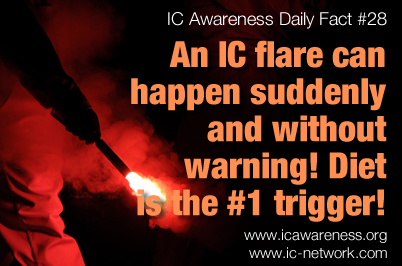Interstitial cystitis and bladder pain patients often experience sudden and unpredictable “flares” or worsening of their symptoms. There are a few distinct types of flares.
A “bladder wall” flare occurs when the bladder wall has been irritated, most often by eating or drinking an acidic or caffeinated food or beverage. While some patients report pain within 30 minutes of eating an offending food, most are felt at night, making sleep almost impossible.
A “pelvic floor” flare occurs when the pelvic floor muscles get tight or are traumatized, often during or after long car rides or intimacy. Stress is also a powerful trigger for this type of flare because patients may be sub-consciously tightening pelvic floor muscles.
The good news is that many flares are preventable by following simple self-help strategies (i.e. diet modification, muscle relaxation and other Step One Treatments).
Learn more in the ICN Flare Management Center

